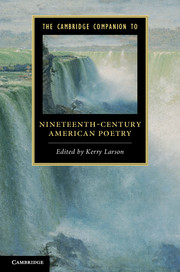Book contents
- Frontmatter
- Introduction
- I MANDATES, MOVEMENTS, AND MANIFESTOES
- 1 The reception of nineteenth-century American poetry
- 2 American Indian poetry in the nineteenth century
- 3 The poet as Poetess
- 4 Transcendentalist poetics
- 5 Slavery and its metrics
- 6 Weathering the news in US Civil War poetry
- 7 The “Twilight of the Poets” in the era of American realism, 1875–1900
- II INDIVIDUAL AUTHORS
- Selected guide to further reading
- Index
- Cambridge Companions to…
4 - Transcendentalist poetics
from I - MANDATES, MOVEMENTS, AND MANIFESTOES
Published online by Cambridge University Press: 28 November 2011
- Frontmatter
- Introduction
- I MANDATES, MOVEMENTS, AND MANIFESTOES
- 1 The reception of nineteenth-century American poetry
- 2 American Indian poetry in the nineteenth century
- 3 The poet as Poetess
- 4 Transcendentalist poetics
- 5 Slavery and its metrics
- 6 Weathering the news in US Civil War poetry
- 7 The “Twilight of the Poets” in the era of American realism, 1875–1900
- II INDIVIDUAL AUTHORS
- Selected guide to further reading
- Index
- Cambridge Companions to…
Summary
In the opening paragraph of his essay “The Transcendentalist,” first delivered as a lecture on December 23, 1841, as part of a series on “The Times,” Ralph Waldo Emerson offers this helpful formulation: “What is popularly called Transcendentalism among us, is Idealism; Idealism as it appears in 1842.” But what is idealism? Unsystematic in his use of the term, which titles the sixth section of his Nature (1836) and which he associated at various moments in various moods with, among others, Plato, Plotinus, George Berkeley, Emanuel Swedenborg, Immanuel Kant (whose 1781 Critique of Pure Reason uses the term “transcendental” to describe knowledge that transcends what he called Understanding [Verstand], or knowledge provided by sense experience), Johann Gottlieb Fichte, Friedrich von Schelling, Samuel Taylor Coleridge, Thomas Carlyle, Hinduism, Buddhism, and Sufism, Emerson continues in the next sentence of “The Transcendentalist” with a straightforward distinction:
As thinkers, mankind have ever divided into two sects, Materialists and Idealists; the first class founding on experience, the second on consciousness; the first class beginning to think from the data of the senses, the second class perceive that the senses are not final, and say, The senses give us representations of things, but what are the things themselves, they cannot tell. The materialist insists on facts, on history, on the force of circumstances and the animal wants of man; the idealist on the power of Thought and of Will, on inspiration, on miracle, on individual culture. These two modes of thinking are both natural, but the idealist contends that his way of thinking is in higher nature.
- Type
- Chapter
- Information
- Publisher: Cambridge University PressPrint publication year: 2011
- 2
- Cited by

